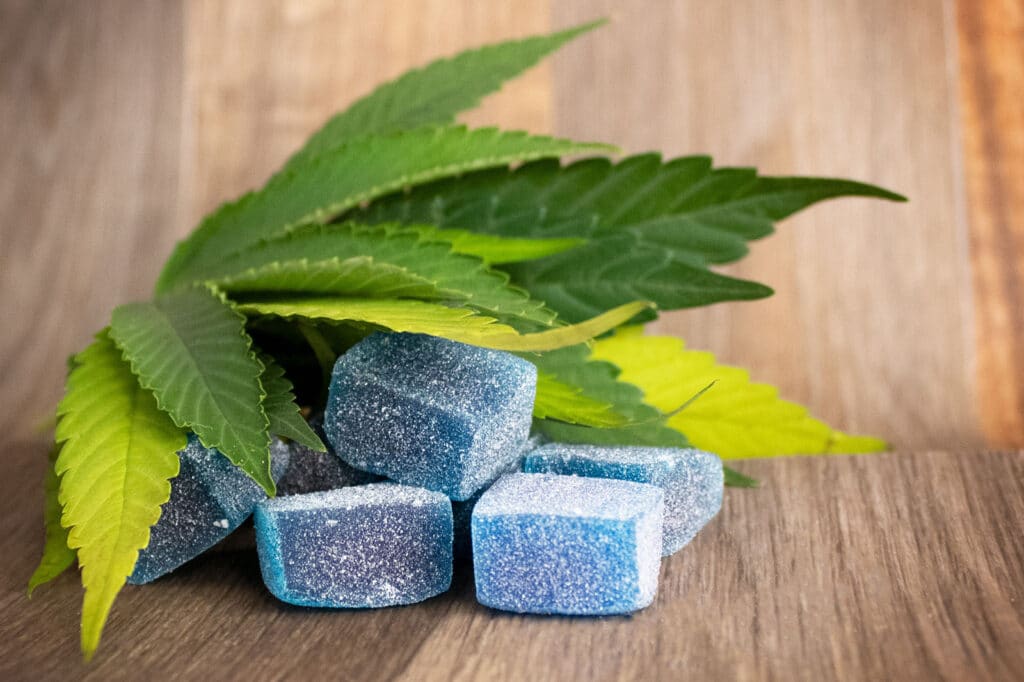Do People Get Addicted to Delta 8 THC?
Delta-8-tetrahydrocannabinol (Delta 8 THC) is a relative newcomer to the world of substances that change how you feel. Delta 8 is said to deliver a high that’s similar to the high produced by delta-9-tetrahydrocannabinol (delta 9 THC), otherwise known as marijuana, weed, grass, or cannabis.

However, the high produced by Delta 8 is said to be considerably less intense than the high you get from Delta 9. Much debate has ensued as to the safety, potency, addictive potential, and long-term side effects of delta-8 THC.
Where Did Delta 8 Come From?
Way back in the early 1940s, Roger Adams, an American chemist at the University of Illinois, was attempting to synthesize the delta 8 compound. He and his team achieved a partial synthesis of delta 8 and were the first to do so.
Later, in the 1960s, two research scientists, Dr. Raphael Mechoulam, a renowned Israeli chemist, and his colleague at the Hebrew University of Jerusalem, Yechiel Gaoni, were conducting groundbreaking studies on the effects of various cannabis compounds. They found that the delta 8 compound had unique psychoactive properties similar to those found in delta 9 THC, otherwise known as marijuana.
After conducting a series of experiments, the scientists were finally able to fully isolate delta 8 from the other cannabis compounds. Raphael Mechoulam became known as the “father of cannabis,” and researchers have been studying the delta 8 THC molecule to learn more ever since.
Although Delta 8 has been around for 80 years, researchers say they still know next to nothing about it. Researchers have only been studying the delta-8 molecule for the last few years. In fact, unless you are a fairly frequent cannabis user, you might never have heard of it.
What Do We Know About Delta 8 THC
Delta 8 is a naturally occurring compound in the cannabis plant. However, it only occurs in trace amounts. Nevertheless, thanks to the work of Roger Adams and Raphael Mechoulam summarized above, researchers can now extract the delta 8 molecule and isolate it in the laboratory. Because delta 8 is synthesized in a laboratory, it can have much higher THC levels than the natural levels found in the raw extracts.
Does Delta 8 THC Make You Feel High?
Many people who use Delta 8 claim that it delivers a high that’s comparable to that of marijuana. The only difference is that the high from Delta 8 is gentler and less intense than the high you get from Delta 9.
Users report that Delta 8 delivers a soothing and peaceful euphoria without the paranoia and anxiety that users often report with Delta 9. Users call the drug “diet weed” and “marijuana lite.” Regardless of the apparent differences, delta 8 still binds to cannabis receptors in the body and brain just like its big brother Delta 9.
Small amounts of delta 8 THC are present in hemp from the cannabis sativa plant. Because there isn’t much delta 8 in the hemp, researchers supplement the amount they are able to extract with synthetically produced delta 8 made from cannabidiol (CBD) and hemp.
The chemical structure of delta 8 is similar to the chemical structures of delta 9 and delta 10. Delta 10 THC is another cannabis strain about which researchers know very little. In fact, they know even less about delta 10 than they do about delta 8. Users claim that delta 10 is relaxing and has a high that’s less potent than delta 8 and delta 10.
Where Are Delta 8 THC Products Sold?
These products are readily available in convenience stores, online boutiques, and specialty shops. You can get Delta 8 gummies, brownies, tinctures, and vapes, just to names a few.
However, because there is zero oversight, these over-the-counter THC products can contain virtually anything, including a host of harmful chemicals and impurities. There can be a huge discrepancy in quality between the THC products you purchase at a convenience store versus the THC products you would receive at a licensed medical marijuana dispensary.
Do These New THC Strains Show Up On a Drug Test?
If you take a drug test after ingesting delta 8, it won’t escape detection. Urine tests screen for THC metabolites and all of the THC strains produce metabolites. Also, it’s not unusual for products to be mislabeled. You might think you’re buying hemp when, in fact, you’re getting Delta 9.

Is Delta 8 Legal?
The legality of delta 8 THC is presently under debate. Technically speaking, delta 8 is part of the hemp plant, and because the hemp plant is legal, then delta 8 must be legal, too. It is currently being marketed as a “legal high.”
However, the U.S. Drug Enforcement Administration (DEA) has classified Delta 8 as a schedule 1 controlled substance. A schedule 1 controlled substance is thought to have no medical value and puts those who use it at high risk for developing a substance use disorder.
States differ on how they are handling issues that impact the legality of delta 8. Some states have outright banned it. Other states are considering banning it or restricting it. More than a few states are allowing Delta 8 under their existing recreational marijuana laws. Still, others are ignoring the issue altogether.
Adding to the confusion is the difference between psychoactive cannabis products such as Delta 8 and 9 versus hemp and CBD products that have no intoxicating effects.
The Farm Bill of 2018 legalized the sale of CBD products at the federal level if they contained less than .3% of delta 9 THC. The Farm Bill caused a massive overproduction of CBD products, and CBD prices crashed. Hemp farmers needed new markets for their products, and Delta 8 fit the bill.
What Are the Safety Issues Around Delta 8?
Unlike delta 9, which is directly extracted from the cannabis plant, delta 8 is created synthetically in a laboratory and is not regulated by the Food and Drug Administration (FDA). However, the agency has strongly cautioned against the use of delta 8 due to the harmful synthetic chemicals and household ingredients used to synthesize it.
Some users mistakenly believe that delta 8 THC is safer than delta 9 because the high is less intense. However, there is no medical or scientific evidence to support this. In fact, delta 9 and delta 10 have been found in products that are sold as delta 8. Without safety regulations and oversight, there is no way to know what delta 8 products actually contain or how much is present in any given dose.
If consumers don’t know what they’re consuming, they are exposing themselves to all sorts of risks and harms that can damage the spirit, soul, body, and mind. Scientists don’t know how long delta 8 stays in the body or what it actually does to produce that “gentle high.”
Although delta-9 THC can cause problems as well, it’s been around long enough that people know what to expect when they ingest it. Because there is a considerable amount of information available about Delta 9, users can make reasonably well-informed decisions about whether to use it, how often to use it, and how much to use. That is not the case with delta 8 or delta 10.
Why Do People Use Delta 8?
Users report that because delta 8 is less intense than delta 9, they can use it to enjoy the euphoric part of the THC high without the intensity and impairment that many experience with delta 9.
The drug is also used to relieve chronic pain while reducing stress, anxiety, and depression. Users say that it helps to reduce inflammation while improving sleep and appetite. Delta 8 is also used to reduce stimulation overload, relax a hyperactive immune system, and calm the spirit. A number of people prefer Delta 8 over Delta 9.
Is Delta 8 THC Addictive?
Scientists have found evidence of tolerance and dependence in THC users. These two markers are thought to be precursors of addiction. According to the National Institute on Drug Abuse (NIDA), roughly 30% who are using marijuana go on to develop a THC addiction. Those who are under the age of 18 with brains that are still developing are most likely to develop a cannabis use disorder.
Reported Adverse Events Involving Delta 8 Addiction
Between December 1, 2020, and February 28, 2022, the FDA received 104 adverse event reports from people who had used delta-8 THC. Here is a list of the most commonly reported symptoms:
- Confusion
- Anxiety
- Vomiting
- Tremor
- Hallucinations
- Dizziness
- Loss of consciousness
If you would like more information about THC products and want to talk to someone confidentially, we are here for you 24/7. Contact Mid Hudson Addiction Recovery in New York, a treatment center, and get the information you need to make healthy decisions for yourself, especially for your mental health, if you are and your loved one suffering from substance abuse or addiction (whether it is due to marijuana use, edibles, thc use, or what might you call it) and want to undergo detox or marijuana addiction treatment.
FAQ
Is Delta-8 addictive?
What are the side effects of Delta-8 withdrawal?
How can family members help a loved one struggling with Delta-8 addiction?

